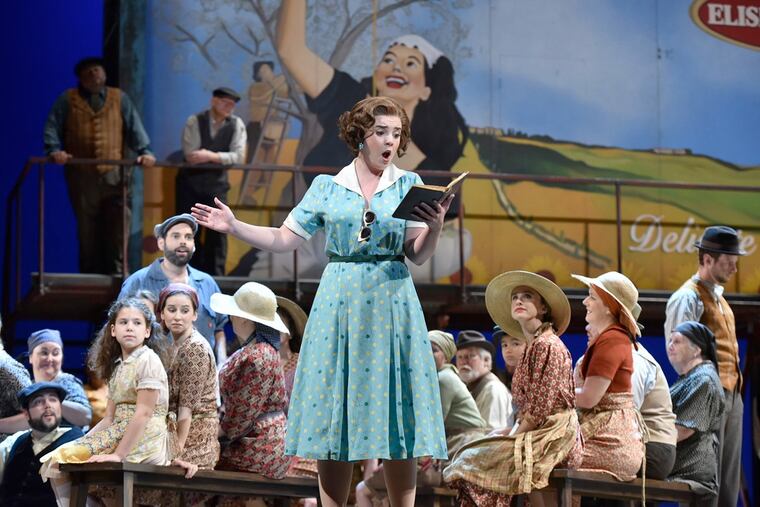Sarah Shafer's crystalline voice graces Opera Philadelphia
The current season of Opera Philadelphia's high ambition came, if not to a rest, then at least to a relative slowing Friday night with the opening of a Santa Fe Opera/Stephen Lawless production of L'elisir d'amore. This is the company's fourth iteration of the work since 1982, and though Donizetti's score can grow dull, there are still good reasons to believe that there is magic to be had between the notes.

The current season of Opera Philadelphia's high ambition came, if not to a rest, then at least to a relative slowing Friday night with the opening of a Santa Fe Opera/Stephen Lawless production of L'elisir d'amore. This is the company's fourth iteration of the work since 1982, and though Donizetti's score can grow dull, there are still good reasons to believe that there is magic to be had between the notes.
The current iteration at the Academy of Music has at least two such reasons. One is the conductor, Corrado Rovaris, whose subtly flexible beat drew expressive substance from an excellent orchestra, chorus and cast of some surprising strengths. The other is Sarah Shafer, a young soprano whose Adina was a revelation of a particular kind. Donizetti's music can seem simple: the predictable form, the monotonous and limited harmonic changes. Productions can fall back on the comic idiocy of the story. But with the right kind of musical interpretation, bel canto bliss takes hold, and the music (though still limited) takes flight.
You could hear it happening all night in the voice and characterization of Shafer. Local audiences have tracked the soprano making use of every last bit of mentorship the city has to offer - from her Curtis Institute days, Astral Artists dates, a fruitful partnership in lieder with pianist Richard Goode, and a guiding hand from vocal veteran Benita Valente. If there were any doubt that her gift for intimacy could fill a 2,900-seat opera house, Shafer easily settled the question. She has a beautifully crystalline sound, perfectly true intonation, glowing warmth, and a total presence that (if not huge or showy) hews in meaningful ways to text. Adina is an inconsistent personality, making a somewhat unexplained journey from fickle and superficial to sincere. Shafer explains it in what her voice does. There was no end of pleasure in hearing the way she perfectly tracked the pitch and color or her instrumental doubles in the orchestra pit.
This Elixir of Love updates action to Italy in the 1940s. Sets are spare, if handsome, and a clever billboard carries advertisements and becomes a window into mood-setting landscapes. Nemorino here has been made into a modest auto mechanic, and the comings and goings of cars and scooters add to the kind of visual comedy and overly busy stage antics this company loves. Look for an unusual supernumerary.
Tenor Dimitri Pittas, a late replacement as Nemorino, doesn't have the kind of big voice the role demands in spots, and I suspect that he will uncover a greater sense of security in the quiet urgency needed in the work's best aria, "Una furtiva lagrima." Elsewhere he had a beautiful sheen and a nimble sense of tone color. Craig Verm was fine (Sergeant Belcore, Nemorino's rival), as was Katrina Thurman (Gianetta). Kevin Burdette was perfect as Doctor Dulcamara. He had the unctuous looks. But he had the voice, too, dipping in to a sound blend of cheer and edge that allowed him to explain, vocally, why we fall for a good huckster every time.
Additional performances: May 4, 6, and 8 at the Academy of Music, Broad and Locust Streets. Tickets $19-$239. www.operaphila.org, 215-732-8400.